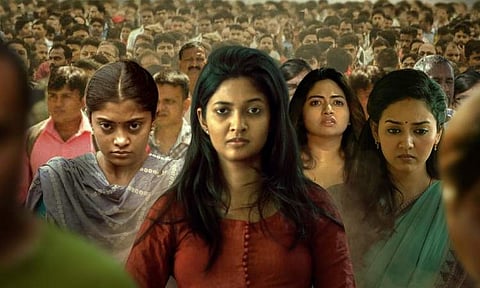Kannagi Movie Review: Good intentions fail to save this film
Rating:(1.5 / 5)
During one crucial scene from Kannagi, a young woman who is just minutes away from getting married, feels a sense of discomfort. We are never told what the issue is. But with her overbearing mother ripping off a part of her saree and handing it over to the daughter, who then carefully straddles her way through to the mandapam, we know what it is. While the representation of a girl getting married during her periods might seem like a step forward, her widowed mother leaving the mandapam because of her 'inauspiciousness' is three steps back. This is precisely what Kannagi is. The film tries to talk about the feminine energy and problems that haunt women but the superficialness of it all ends up making us feel we are looking at a poster for feminism rather than a feminist film.
Cast: Keerthi Pandian, Ammu Abhirami, Mayilsamy, Mounika, Vidya Pradeep, Shaalin Zoya, and others
Director: Yashwanth Kishore
Kannagi’s screenplay opts for hyperlink storytelling, narrating four different situations that any woman of today’s time can relate to. We have a conservative (also read as casteist, narrow-minded, and overbearing) mother (Mounika) along with a liberal father (Mayilsamy) trying to get their daughter Kalai (Ammu Abhirami) married. There is Nethra (Vidya Pradeep), who is in the middle of a divorce proceeding. We also have the free-spirited and non-committal Nadhi (Shaalin Zoya), and finally, Gita (Keerthi Pandian) who is struggling to abort a child she wasn't prepared for. Kannagi tries to address the struggles of womanhood, but in turn, forgets to expose the reasons behind this and opts for convenient paradigm shifts and quirks to make its point.
For example, why should Nadhi wear her lingerie on top of her office attire to stand up against the system? Why should Nethra say lines like “enaku anbu venaam, anga edam mattum podhum” or “na inga irukardhu dhan mariyadha” as reasons for not giving in to a mutual divorce. You may perhaps think that these dialogues may merely be adding as a tension mounting factor for the final conflict to dawn upon us, but when the film pairs up light music and heartbeats when talking about adjustments that women should make post-marriage and abortion, Kannagi loses its stand and becomes murky instead. Director Yashwanth Kishore, who also doubles up as an actor and travels along with Gita’s story, seems a force fit for his role.
The standout performers are Ammu Abhirami and Mayilsamy, who have a wonderfully emotional scene together that hits all the right notes. However, the film’s writing bogs down in the subject matter. The final “twist” is predictable, but that is not the biggest problem. It is the lack of consistency in the character arcs that are troubling. It is interesting to see Kalai’s family setup. The pieces are there — a liberal father and an authoritative mother — who are at two ends of each issue. The mother nitpicks every prospective alliance, and her father is supportive. But for all its posturing, we never get to see the potential bride talk about her wants. This soon becomes a perennial problem in the rest of the three segments. Borrowing its title from a woman’s name who took her rage fast enough to burn a city, the women of Kannagi seem to be too laid back to take control of their own lives. Even Nadhi, who is the most vocal out of the four, gets easily rebuked when her boyfriend drops the P word to annoy her. A potential mother-in-law once accepting of remarriage becomes an obstacle later. The film never really addresses the importance of pro-choice, and it just weakens the film even further. All the minute details finally lead up to the “twist”, which becomes the mother of all inconsistencies of Kannagi. The segments of the film seem like a social media filter put on them and are burdened by choppy editing. The need to make each of these segments stand out ends up with a rather nullifying dull effect.
Kannagi becomes a classic example to reiterate that just intentions are not enough to make a good film. Given the power of filmmaking and how modern times have been riding on the popularity that certain topics evoke, it is once again cemented that mere ideas aren’t enough to cause a change. The film touches upon relevant topics and tries to take the right stand, but the portions lost in translation gain dominance, thus rendering a film just one in thousands voicing out for the needful.

